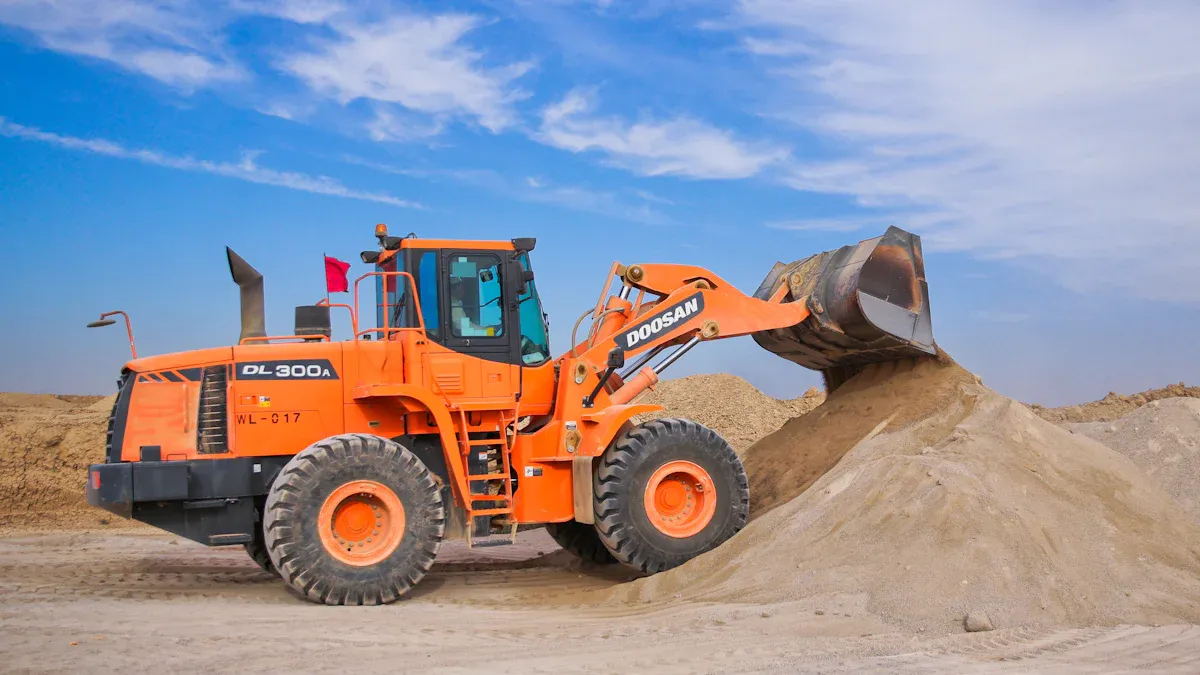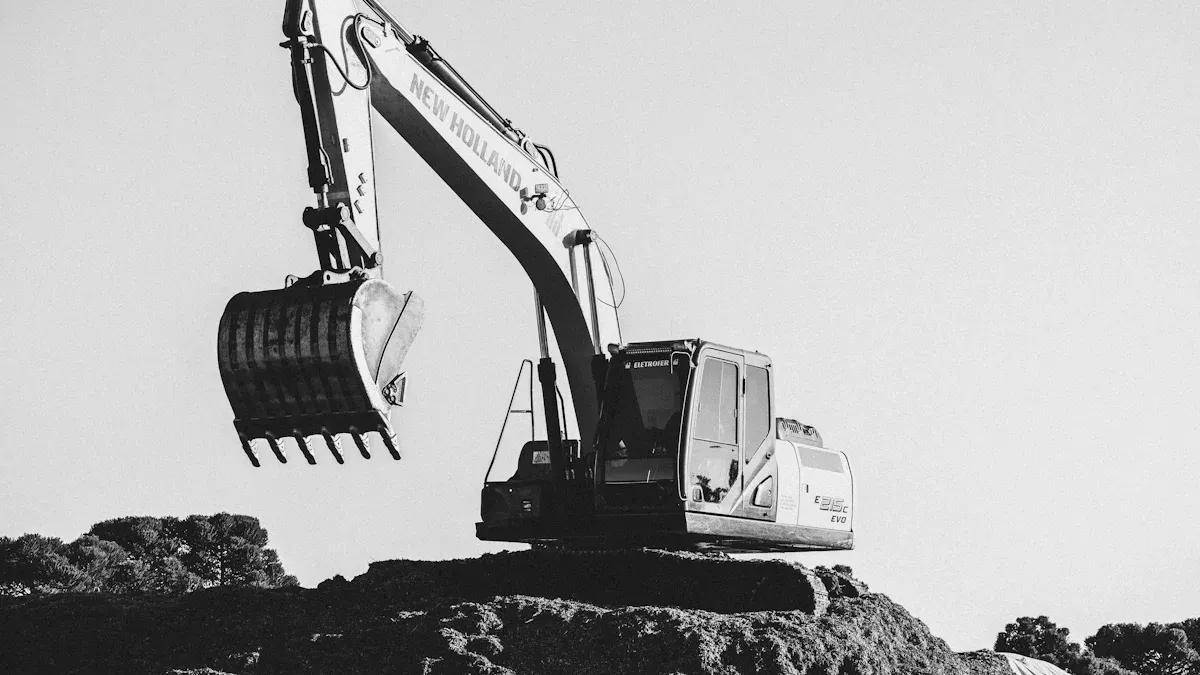
Bucket tooth bolts secure bucket teeth to attachments on heavy machinery like excavators and loaders. Their robust construction enhances durability and efficiency in demanding environments. OEM track shoe bolts and heavy-duty track connection bolts ensure stable performance under extreme stress. Mine-grade cutting edge bolts and high-strength plow bolts deliver reliability in construction and mining operations.
Key Takeaways
- Bucket tooth bolts hold bucket teeth in place on machines. This keeps them steady and avoids expensive delays while working.
- Strong bucket tooth bolts lower repair costs and help machines last longer. This boosts work efficiency and saves time.
- Installing bucket tooth bolts correctly and checking them often is key. It helps machines work well and stay safe in tough conditions.
Understanding Bucket Tooth Bolts
Definition and Purpose of Bucket Tooth Bolts
Bucket tooth bolts are specialized fasteners designed to secure bucket teeth to heavy machinery attachments, such as excavators and loaders. These bolts are engineered to withstand extreme stress and harsh working conditions, ensuring the stability and functionality of the bucket teeth during operations.
The technical specifications of bucket tooth bolts highlight their strength and durability. For instance, bolts are often classified by grades, tensile strength, and hardness, as shown in the table below:
| Grade | Tensile Strength | Hardness |
|---|---|---|
| 8.8 | 120,000 P.S.I (85.0 Kg/mm²) | HRC26~32 |
| 10.9 | 150,000 P.S.I (105.0 Kg/mm²) | HRC32~38 |
| 12.9 | 170,000 P.S.I (120.0 Kg/mm²) | HRC38~42 |
These bolts are typically made from high-quality materials like 40Cr, which enhances their resistance to wear and tear. Their primary purpose is to ensure that bucket teeth remain securely attached, enabling machinery to perform efficiently in demanding environments. Ningbo Digtech (YH) Machinery Co.,Ltd. emphasizes a quality-first approach, producing bucket tooth bolts that meet stringent industry standards and customer expectations.
Role in Enhancing Heavy Machinery Efficiency
Bucket tooth bolts play a pivotal role in improving the efficiency of heavy machinery. By securely fastening bucket teeth, they prevent loosening or detachment during operations, which can lead to costly downtime and repairs. High-quality bucket tooth bolts contribute to several performance metrics that directly impact operational efficiency:
| Performance Metric | Description |
|---|---|
| Reduced Downtime | High-quality bolts minimize failures and unscheduled maintenance, boosting productivity. |
| Lower Maintenance Costs | Durable designs reduce the need for frequent replacements, saving time and money. |
| Extended Equipment Life | Robust materials protect machinery from excessive wear, ensuring long-term reliability. |
| Energy Efficiency | Properly secured bucket teeth improve digging efficiency, reducing energy consumption. |
| Faster Installation | Easy-to-install bolts decrease setup time, accelerating project timelines. |
Case studies further illustrate the impact of bucket tooth bolts on efficiency. For example, a mining company that adopted wedge-type locks and pins tailored to their equipment significantly reduced maintenance costs and improved productivity. Similarly, a quarrying operation that faced excessive wear on bucket teeth achieved higher efficiency and lower repair expenses after implementing customized bolt solutions.
Engineering analyses also validate the efficiency improvements provided by bucket tooth bolts. Studies, such as those using finite element methods, reveal that poorly designed or improperly secured bucket teeth reduce digging efficiency. Properly installed bucket tooth bolts ensure optimal force distribution, enhancing the overall performance of heavy machinery.
By integrating advanced materials and innovative designs, Ningbo Digtech (YH) Machinery Co.,Ltd. delivers bucket tooth bolts that not only meet but exceed industry expectations. These bolts are essential for businesses seeking to maximize the productivity and longevity of their heavy machinery.
How Bucket Tooth Bolts Work
Working Mechanism of Bucket Tooth Bolts
Bucket tooth bolts operate through a straightforward yet highly effective mechanism that ensures the secure attachment of bucket teeth to heavy machinery. The process involves several key steps, each designed to maximize stability and ease of use:
- Positioning the Tooth: The bucket tooth slides onto the shank located on the bucket lip. Proper alignment of the holes in the tooth and shank is essential for a secure fit.
- Inserting the Bolts: Bucket tooth bolts are inserted through the aligned holes, ensuring a tight connection between the tooth and the shank.
- Securing with Nuts and Washers: Washers and nuts are placed on the bolts and tightened using a wrench or socket set. This step locks the tooth firmly in place.
- Locking the Tooth: For systems using flex pins or roll pins, the pin is positioned on the side or bottom of the shank. A hammer drives the pin through the hole until it locks securely.
- Removing the Pin: When replacing or inspecting the tooth, a hammer and pin punch are used to drive out the flex pin from the opposite side.
- Loosening the Bolts: Nuts and washers are loosened and removed with a wrench or socket set, allowing the bolts to be extracted.
- Sliding Off the Tooth: The bucket tooth is slid off the shank for inspection or replacement.
This mechanism ensures that bucket teeth remain firmly attached during operations, even under extreme stress. The simplicity of the design allows for quick installation and removal, reducing downtime and improving operational efficiency.
| Component | Function |
|---|---|
| Adapters | Connect bucket teeth to the bucket lip, ensuring proper alignment and stability. |
| Retention Systems | Flex pins expand to lock the tooth in place; bolt-on systems use bolts, nuts, and washers for easy replacement. |
Key Features That Improve Durability and Performance
Several features of bucket tooth bolts contribute to their durability and performance, making them indispensable in heavy machinery applications:
- High-Strength Materials: Bucket tooth bolts are typically made from materials like 40Cr, which offers exceptional tensile strength and resistance to wear. This ensures the bolts can withstand the rigors of demanding environments.
- Precision Engineering: The bolts are designed with precise dimensions to ensure a snug fit. This minimizes movement and prevents loosening during operations.
- Corrosion Resistance: Many bucket tooth bolts feature coatings or treatments that protect against rust and corrosion, extending their lifespan in harsh conditions.
- Ease of Installation: The straightforward design of these bolts allows for quick and efficient installation, reducing downtime and labor costs.
- Versatile Retention Systems: Options like flex pins and bolt-on systems provide flexibility, catering to different machinery and operational needs.
These features not only enhance the performance of bucket tooth bolts but also contribute to the overall efficiency and reliability of heavy machinery. Ningbo Digtech (YH) Machinery Co.,Ltd. incorporates these advanced features into its bucket tooth bolts, ensuring they meet the highest industry standards.
Types and Applications of Bucket Tooth Bolts

Common Types of Bucket Tooth Bolts
Bucket tooth bolts come in various types, each designed to meet specific operational needs. These bolts are classified based on their application, strength grade, and material composition. The table below highlights the most common classifications and their technical specifications:
| Classification Type | Description |
|---|---|
| Type of bolts | Track Shoe Bolts, Plow Bolt, Segment Bolt, Sprocket Bolt, Roller Bolt, Hex Bolt, Wheel Bolt |
| Strength grades | 8.8, 10.9, 12.9 |
| Material | 35# high carbon steel for 10.9 grade; 40Cr alloy steel or 35CrMo for 12.9 grade |
| Mechanical Properties | HRC28-32 hardness, tensile strength ≥1000MPa for 10.9; HRC37-42 hardness, tensile strength ≥1220MPa for 12.9 |
These classifications ensure that bucket tooth bolts can withstand the rigorous demands of heavy machinery operations. For example, plow bolts and track shoe bolts are commonly used in high-stress environments due to their superior strength and durability.
Applications in Construction and Industrial Machinery
Bucket tooth bolts play a vital role in various construction and industrial applications. In the construction sector, these bolts secure bucket teeth on excavators and loaders, enabling efficient digging, grading, and material handling. Their robust design ensures that machinery can operate continuously without frequent interruptions for maintenance or repairs.
In industrial settings, such as mining and quarrying, bucket tooth bolts are indispensable. They provide the stability needed for heavy-duty equipment to break through tough materials like rock and ore. The high tensile strength and hardness of these bolts make them ideal for such demanding tasks.
By offering versatility and reliability, bucket tooth bolts enhance the performance of heavy machinery across multiple industries. Ningbo Digtech (YH) Machinery Co.,Ltd. manufactures these bolts to meet the highest standards, ensuring optimal performance in even the most challenging environments.
Installation and Maintenance of Bucket Tooth Bolts

Proper Installation Techniques for Bucket Tooth Bolts
Proper installation ensures that bucket tooth bolts perform optimally and securely fasten bucket teeth to heavy machinery. Following a systematic approach minimizes errors and enhances operational efficiency. The installation process involves the following steps:
- Positioning the Tooth: Slide the bucket tooth onto the shank located on the bucket lip. Ensure the holes in the tooth and shank align perfectly.
- Inserting the Bolts: Insert the bucket tooth bolts through the aligned holes, ensuring a snug fit.
- Securing with Nuts and Washers: Place washers and nuts on the bolts. Tighten them securely using a wrench or socket set to prevent loosening during operations.
- Locking the Tooth: For systems using flex pins or roll pins, position the pin on the side or bottom of the shank. Use a hammer to drive the pin through the hole until it locks firmly in place.
These steps ensure a secure attachment, reducing the risk of detachment during heavy-duty tasks. Proper installation not only enhances safety but also extends the lifespan of the bucket tooth bolt.
Maintenance Tips to Maximize Longevity and Efficiency
Regular maintenance is crucial for maximizing the lifespan and efficiency of bucket tooth bolts. Inspections should focus on identifying wear, corrosion, or loosening. Operators should follow these maintenance tips:
- Inspect Bolts Regularly: Check for signs of wear or damage after every operation. Replace bolts showing significant wear to prevent operational failures.
- Tighten Loose Bolts: Use a torque wrench to ensure bolts remain securely fastened. Loose bolts can compromise the stability of bucket teeth.
- Clean Components: Remove dirt, debris, and moisture from bolts and surrounding areas. This prevents corrosion and ensures smooth operation.
- Apply Anti-Corrosion Treatments: Use protective coatings or lubricants to shield bolts from rust, especially in wet or humid environments.
- Replace Worn Components: Replace washers, nuts, or pins showing signs of wear to maintain the integrity of the retention system.
By adhering to these maintenance practices, businesses can reduce downtime, improve machinery performance, and extend the service life of bucket tooth bolts.
Industry Applications and Benefits
Construction Sector Applications
Bucket tooth bolts play a vital role in the construction industry. Excavators and loaders rely on these bolts to secure bucket teeth, enabling efficient digging, grading, and material handling. Construction sites often involve abrasive materials like gravel, sand, and soil. The durability of bucket tooth bolts ensures that machinery can operate continuously without frequent interruptions.
In addition, the bolts’ high tensile strength allows them to withstand the stress of heavy loads. This feature is particularly beneficial for large-scale projects, such as road construction and building foundations. By ensuring the stability of bucket teeth, these bolts contribute to faster project completion and reduced operational costs.
Mining and Quarrying Uses
The mining and quarrying industries demand equipment that can endure extreme conditions. Bucket tooth bolts are indispensable in these sectors, where machinery must break through tough materials like rock and ore. Their robust design ensures that bucket teeth remain securely attached, even under intense pressure.
Mining operations often involve prolonged use of heavy machinery. The high-strength materials used in bucket tooth bolts, such as 40Cr alloy steel, provide the durability needed for such demanding tasks. These bolts also reduce downtime by minimizing the risk of equipment failure, enhancing overall productivity.
Other Industrial Applications
Beyond construction and mining, bucket tooth bolts find applications in various industrial settings. Industries like agriculture, forestry, and waste management benefit from their reliability. For example, agricultural machinery uses these bolts to secure attachments for plowing and harvesting.
In forestry, bucket tooth bolts help secure tools for cutting and clearing dense vegetation. Waste management equipment also relies on these bolts to handle heavy loads and abrasive materials. Their versatility makes them a valuable component across multiple industries, ensuring efficient and reliable operations.
Bucket tooth bolts are essential for heavy machinery, ensuring durability and operational efficiency in challenging environments. Their robust design minimizes downtime and extends equipment lifespan. Customers frequently praise their reliability and the expertise of suppliers. One customer noted, “Their product quality and customer service are unmatched.” Ningbo Digtech (YH) Machinery Co.,Ltd. delivers premium bucket tooth bolts tailored to diverse industrial needs.
FAQ
1. What materials are commonly used to manufacture bucket tooth bolts?
Bucket tooth bolts are typically made from high-strength materials like 40Cr alloy steel or 35CrMo. These materials ensure durability and resistance to wear in demanding environments.
2. How often should bucket tooth bolts be inspected?
Operators should inspect bucket tooth bolts after every operation. Regular checks help identify wear, corrosion, or loosening, ensuring optimal performance and preventing unexpected failures.
3. Can bucket tooth bolts be reused after removal?
Reusing bucket tooth bolts depends on their condition. If no visible wear or damage exists, they may be reused. However, replacing worn bolts ensures maximum safety and efficiency.
Tip: Always consult the manufacturer’s guidelines for reusability to maintain equipment reliability.
Post time: May-24-2025